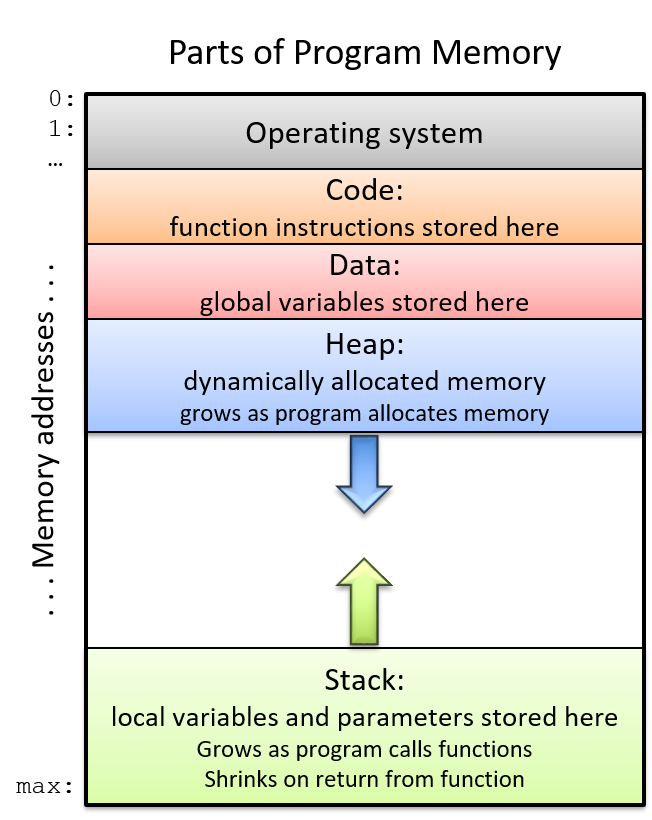2.1. Parts of Program Memory and Scope
The following C program shows examples of functions, parameters, and local and global variables (function comments are omitted to shorten this code listing):
/* An example C program with local and global variables */
#include <stdio.h>
int max(int n1, int n2); /* function prototypes */
int change(int amt);
int g_x; /* global variable: declared outside function bodies */
int main(void) {
int x, result; /* local variables: declared inside function bodies */
printf("Enter a value: ");
scanf("%d", &x);
g_x = 10; /* global variables can be accessed in any function */
result = max(g_x, x);
printf("%d is the largest of %d and %d\n", result, g_x, x);
result = change(10);
printf("g_x's value was %d and now is %d\n", result, g_x);
return 0;
}
int max(int n1, int n2) { /* function with two parameters */
int val; /* local variable */
val = n1;
if ( n2 > n1 ) {
val = n2;
}
return val;
}
int change(int amt) {
int val;
val = g_x; /* global variables can be accessed in any function */
g_x += amt;
return val;
}This example shows program variables with different scope. A variable’s scope defines when its name has meaning. In other words, scope defines the set of program code blocks in which a variable is bound to (associated with) a program memory location and can be used by program code.
Declaring a variable outside of any function body creates a global variable. Global variables remain permanently in scope and can be used by any code in the program because they’re always bound to one specific memory location. Every global variable must have a unique name — its name uniquely identifies a specific storage location in program memory for the entire duration of the program.
Local variables and parameters are only in scope inside the function
in which they are defined. For example, the amt parameter
is in scope only inside the change function. This means that only
statements within the change function body can access the amt
parameter, and an instance of the amt parameter is bound to a
specific memory storage location only within a specific active
execution of the function. Space to store a parameter’s
value is allocated on the
stack when the function gets called, and it is deallocated from the stack
when the function returns. Each activation of a function gets its own
bindings for its parameters and local variables. Thus, for recursive
function calls, each call (or activation) gets a separate stack
frame containing space for its parameters and local variables.
Because parameters and
local variables are only in scope inside the function that defines them,
different functions can use the same names for local variables and
parameters. For example, both
the change and the max functions have a local variable named val.
When code in the max function refers to val it refers to its
local variable val and not to the change function’s local variable
val (which is not in scope inside the max function.)
While there may occasionally be times when using global variables in C programs is necessary, we strongly recommend that you avoid programming with global variables whenever possible. Using only local variables and parameters yields code that’s more modular, more general-purpose, and easier to debug. Also, because a function’s parameters and local variables are only allocated in program memory when the function is active, they may result in more space-efficient programs.
Upon launching a new program, the operating system allocates the new program’s address space. A program’s address space (or memory space) represents storage locations for everything it needs in its execution, namely storage for its instructions and data. A program’s address space can be thought of as an array of addressable bytes; each used address in the program’s address space stores all or part of a program instruction or data value (or some additional state necessary for the program’s execution).
A program’s memory space is divided into several parts, each of which is used to store a different kind of entity in the process’s address space. Figure 1 illustrates the parts of a program’s memory space.

The top of a program’s memory is reserved for use by the operating system, but
the remaining parts are usable by the running program. The program’s
instructions are stored in the code section of the memory. For example, the
program listed above stores instructions for the main, max, and change
functions in this region of memory.
Local variables and parameters reside in the portion of memory for the stack. Because the amount of stack space grows and shrinks over the program’s execution as functions are called and returned from, the stack part of memory is typically allocated near the bottom of memory (at the highest memory addresses) to leave space for it to change. Stack storage space for local variables and parameters exists only when the function is active (within the stack frame for the function’s activation on the stack.)
Global variables are stored in the data section. Unlike the stack, the data region does not grow or shrink — storage space for globals persists for the entire run of the program.
Finally, the heap portion of memory is the part of a program’s address space associated with dynamic memory allocation. The heap is typically located far from stack memory, and grows into higher addresses as more space is dynamically allocated by the running program.